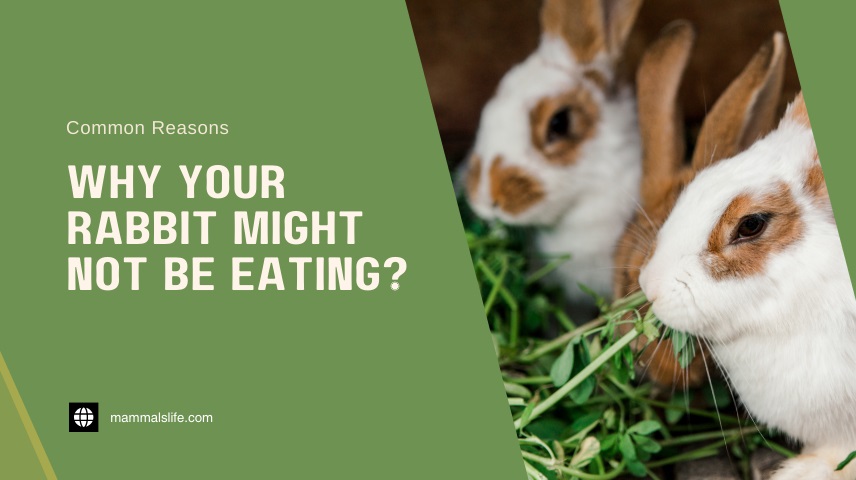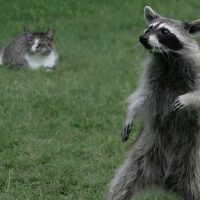Last Updated on February 22, 2025 by Mammals Life
Your rabbit might not be eating due to dental problems or gastrointestinal issues. Stress and changes in diet can also cause a lack of appetite.
Rabbits are sensitive animals that require a stable environment and consistent care. Any sudden change in their routine, diet, or surroundings can lead to stress, making them refuse food. Dental issues like overgrown teeth can cause pain, discouraging them from eating.
Gastrointestinal problems such as GI stasis can also be a reason. Recognizing these signs early and consulting a veterinarian is crucial for your rabbit’s health. Providing a balanced diet, regular check-ups, and a stress-free environment can help prevent these issues. Always monitor your rabbit’s eating habits closely to ensure their well-being.
8 Common Reasons Why Your Rabbit Might Not Be Eating
Rabbits are delicate creatures and changes in their eating habits can be alarming. Understanding why your rabbit isn’t eating can help in addressing the underlying issues. Below are 8 common reasons why your rabbit might not be eating, each explained in detail.
Dental Problems
Rabbits have continuously growing teeth. Dental problems are a common cause of eating issues in rabbits.
Signs of dental problems include:
- Drooling
- Weight loss
- Difficulty chewing
Common dental issues include:
| Issue | Description |
|---|---|
| Malocclusion | Misaligned teeth |
| Overgrown Teeth | Teeth that grow too long |
| Tooth Abscesses | Infections around the teeth |
If you suspect dental problems, consult a veterinarian. Regular dental check-ups can prevent many issues.
Stress Or Anxiety
Stress or anxiety can significantly impact your rabbit’s appetite. Rabbits are sensitive to changes in their environment.
Common stressors include:
- New pets or people
- Changes in habitat
- Loud noises
To reduce stress:
- Keep a consistent routine
- Provide a quiet and safe space
- Spend time bonding with your rabbit
Observing your rabbit’s behavior can help identify stress triggers.
Gastrointestinal (GI) Stasis
Gastrointestinal (GI) stasis is a serious condition. It occurs when the digestive system slows down or stops.
Symptoms include:
- Lack of appetite
- Small or no fecal pellets
- Lethargy
Causes of GI stasis:
- Poor diet
- Stress
- Dehydration
Immediate veterinary care is crucial. GI stasis can be life-threatening if not treated promptly.
Changes In Diet Or Feeding Routine
Rabbits are creatures of habit. Changes in diet or feeding routine can cause them to stop eating.
Common changes include:
- New types of food
- Different feeding times
- Changes in food quantity
To minimize disruptions:
- Introduce new foods gradually
- Maintain a consistent feeding schedule
- Monitor for any adverse reactions
Gradual changes help rabbits adapt without losing their appetite.
Environmental Factors
Environmental factors play a crucial role in your rabbit’s eating habits. Factors include:
- Temperature
- Lighting
- Cleanliness
Ensure your rabbit’s environment is:
- Comfortable and stable in temperature
- Well-lit but not overly bright
- Clean and free from strong odors
A healthy environment promotes better eating habits.
Illness Or Pain
Illness or pain can cause a rabbit to stop eating. Common illnesses include:
- Respiratory infections
- Urinary tract infections
- Arthritis
Signs of illness or pain:
- Hunched posture
- Lethargy
- Labored breathing
If you notice these signs, consult a veterinarian. Prompt treatment can alleviate discomfort and restore appetite.
Behavioral Issues Or Boredom
Behavioral issues or boredom can affect your rabbit’s eating habits. Rabbits need mental and physical stimulation.
Signs of boredom include:
- Chewing on cage bars
- Excessive digging
- Destructive behavior
To prevent boredom:
- Provide toys and activities
- Ensure adequate space for exercise
- Spend quality time with your rabbit
Engaging your rabbit can improve their overall well-being.
When To Seek Veterinary Help
Knowing when to seek veterinary help is crucial. If your rabbit stops eating for more than 24 hours, immediate action is necessary.
Other signs to watch for:
- Weight loss
- Diarrhea
- Fever
Take your rabbit to the vet if:
- Symptoms persist despite your efforts
- There are signs of severe illness or pain
- Your rabbit’s behavior changes dramatically
Early intervention can save your rabbit’s life.
Frequently Asked Questions
Why Is My Rabbit Not Eating Hay?
Rabbits might avoid hay due to dental issues or stress. Always ensure fresh, quality hay is available.
How Can Stress Affect My Rabbit’s Appetite?
Stress can cause rabbits to lose appetite. Loud noises, new environments, or changes in routine can be stress triggers.
What Should I Do If My Rabbit Stops Eating?
Consult a vet immediately. Lack of appetite in rabbits can be serious and requires prompt medical attention.
Can Dental Problems Cause Rabbits To Stop Eating?
Yes, dental issues are common reasons. Overgrown teeth can make eating painful, leading to appetite loss.
What Foods Can Encourage A Rabbit To Eat?
Fresh greens like romaine lettuce, herbs, and small carrot pieces can stimulate your rabbit’s appetite.
Conclusion
Understanding why your rabbit isn’t eating is crucial for its health. Address potential issues promptly and consult a vet. Pay attention to dietary needs and environmental factors. Proper care ensures a happy, healthy bunny. Implement these tips to keep your rabbit thriving and munching away contentedly.








